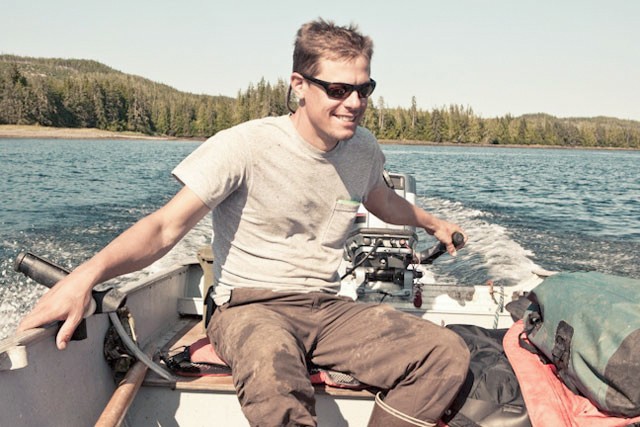On the Road Again or River, Plane, Trail

Courtesy Photo/ travelchannel.com Steven Rinella, GVSU Alumnus and host of a new Travel Channel series, The Wild Within
Jan 27, 2011
This sentiment is what Grand Valley State University alum, author and host of a new Travel Channel series Steven Rinella said he learned while working on his master’s degree in creative non-fiction at the University of Montana.
“Writing is lonely and very boring,” he said. “So I let my research be very exciting. I go to great crazy places and then come home and write about them.”
Since his youth, Rinella has made trekking the wilderness a priority, learning the trade and skills of a proper outdoorsman, something he values deeply and at one point made a living from as a fur trapper. But he quickly realized the business was a thing of the past and found himself pursuing a writing degree.
While there, Rinella enjoyed the fruits of the wilderness and the experiences of what he described as “literary heaven,” but going to graduate school didn’t teach him how to write.
“You don’t learn how to write in graduate school,” Rinella said. “Graduate school does a couple of things, one being it turns you on to good writers. I read more books in a year than I had in my whole life.”
In school, people have a chip on their shoulder, he said. There is competition in the room, but if you find a good teacher, one that wants you to succeed, that’s the most important thing in school.
Another thing Rinella said he learned rather quickly is you learn to write often.
“They ask you to write a lot,” he said. “That way you have more time to write the bad stuff out of you. Everyone has tons of bad stuff to write out of them before you can start writing the good stuff.”
Lastly, he said, you’d develop some good contacts.
“You meet writers and you learn what they’ve done and what they do,” he said. “You have to be immersed in an environment of reading and writing. I have an MFA, but no one has ever asked me to see proof of my Master’s. It was only the experience that mattered.”
From his passions for the outdoors and the skill of writing, Rinella has crafted for himself a career that affords him the opportunity to lash those passions together, but what is more interesting are the variable sources that construct Rinella’s growth as a writer.
“I’m an outdoor writer. I do a lot outdoor writing, but I didn’t learn how to write the way I do by reading other writers who write about what I write about,” Rinella said. “I read writers who write about things I have no idea about.”
One of his favorite books, Dispatches by Michael Herr, is a New Journalism account of the Vietnam War that gives perspectives from soldiers.
“It has nothing to do with my life and nothing to do with what I write about,” He said. “But O’Hare has a way with the language and a way of describing people, places and scernarios and I think subconsciously what I do is borrow subconsciously from these writers; John McPhee, Ian Frazier, Joan Didion.”
Recently, Rinella returned from filming the last episode in an eight-part series called “The Wild Within,” which debuted Jan. 15 on the Travel Channel.
While, he never set out to be on television, Rinella can thank his novels “The Scavenger’s Guide to Haute Cuisine” and “American Buffalo: In Search of a Lost Icon” as well as a long span of magazine writing for publications including “Outside” and “The New Yorker” for the opportunity. He said he hopes to accomplish with the show what he has done in his writing, by defending the outdoors and the hunter’s lifestyle.
“A lot of people in this world hate hunting or hate hunters. So I think that its important as an artist or writer it’s important to have an enemy or maybe in some way to feel persecuted by something,” he said. “I think that having the burden of explaining hunting and explaining the outdoors brings a lot to my writing. It’s important to me to get it right. It’s important to me to explain it properly.”
Instead of hostilely trying to substantiate his passions to others, Rinella approaches his writing in a way that would seem abstract in making his ideas clear and poignant. Without directly addressing the nature of his experiences, Rinella said he looks for a way to mark out the true reality of what he puts on paper not solely from the outdoorsman’s perspective but from a perspective that is more encompassing or shares a certain commonality with the ability to understand multiple perspectives.
“The biggest thing to come away with in explaining a place comes from a more literary sense and not some kind of engrained personal sense,” he said. “Like the use of a metaphor, I use them, but when I do in a way of explaining something, the metaphor is often very distant from what I’m trying to describe.”
He said in filming the show he often had concerns about whether or not what he was doing was detracting from his writing.
“I think that there is this pressure in the U.S. to make things into television,” he said. “You hear people say, ‘Oh books are dead, publishing is dead.’ So when you think about your longevity as a writer, television becomes seductive, full of life and full of money.”
“To this day, as much as I have enjoyed doing television, I wonder about what I’m doing,” he said. “In my mind it is a much high art and it hard and its awful, but it’s the thing I admire most. When I die, I much rather have them carve writer into my headstone than TV host.”























